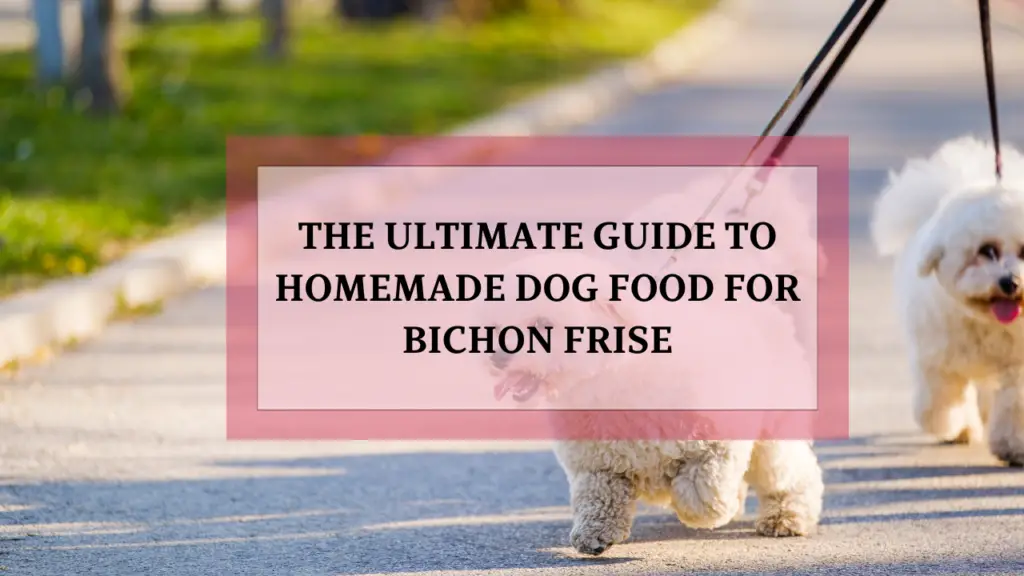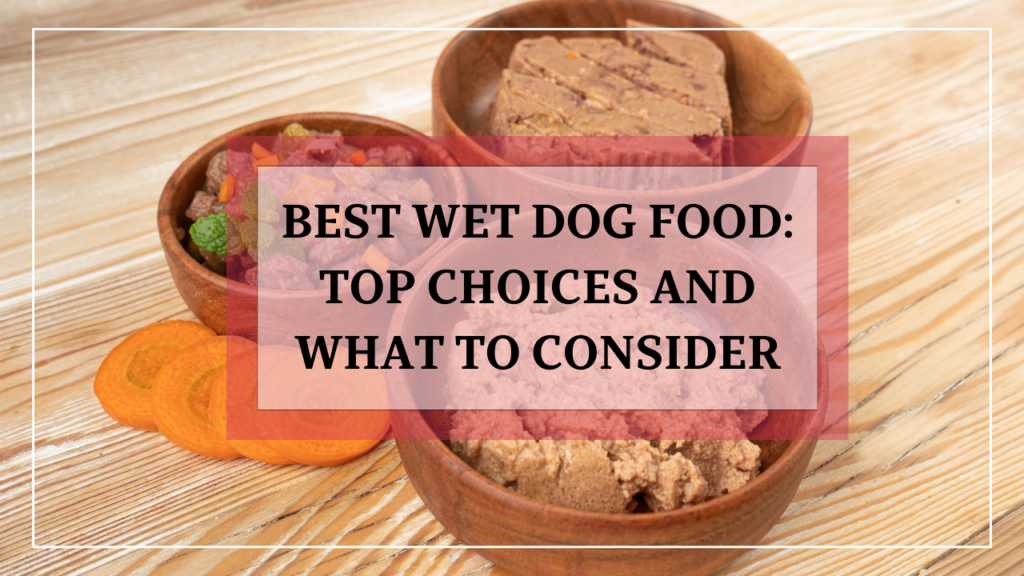Bichon Frises are small, energetic dogs with a friendly, playful nature. Like all pets, their health starts with what they eat. Whether you’re looking to offer more control over your dog’s diet or wanting to avoid the chemicals in commercial food, homemade dog food can be an excellent solution. In this guide, we will explore everything you need to know about homemade dog food for Bichon Frise— from understanding their specific nutritional needs to crafting the perfect recipes that will keep them happy and healthy.
Why Homemade Dog Food for Bichon Frise?
Health Benefits of Homemade Food
Making homemade food for your Bichon Frise offers numerous advantages, the most notable being control. With homemade food, you can ensure the freshest, highest-quality ingredients without additives or preservatives. For many dog owners, this means improved overall health for their pet.
Bichon Frises are known to have sensitive stomachs and can sometimes experience food allergies. Homemade meals allow you to customize ingredients to fit your dog’s specific needs, whether that means avoiding grains, proteins, or vegetables that might cause allergic reactions.
Addressing Allergies and Sensitivities
One of the common issues with commercial dog food is the presence of fillers like corn, soy, and wheat, which can lead to allergies or digestive issues. With homemade dog food, you can create a formula that avoids these ingredients, promoting better digestion and fewer allergic reactions. Plus, you’ll notice your dog’s coat will shine brighter, their skin will stay healthier, and they’ll be less likely to experience digestive discomfort.
Nutritional Requirements for a Bichon Frise
Before you start preparing food for your Bichon Frise, it’s essential to understand their nutritional needs. Like all dogs, Bichon Frises need a balanced diet to thrive. Here’s a breakdown of the key nutrients your dog needs:
Protein
Protein is crucial for muscle growth, repair, and immune function. Your Bichon Frise’s food should contain about 25-30% protein. Good sources of protein include:
- Chicken: A lean and easily digestible protein.
- Turkey: Another excellent, low-fat source of protein.
- Beef: Opt for lean cuts to reduce fat content.
- Fish: Salmon or sardines are great options for healthy omega-3 fats.
Healthy Fats
Fats are not only a vital energy source but also help keep your dog’s skin and coat shiny. Bichon Frises, in particular, benefit from omega-3 and omega-6 fatty acids. Include these fats in your dog’s diet through:
- Flaxseeds
- Olive oil
- Fish oil (for Omega-3s)
Carbohydrates
Carbohydrates provide your dog with long-lasting energy. Healthy options for Bichon Frises include:
- Brown rice: A gentle carb that provides fiber.
- Sweet potatoes: Full of nutrients and easy on the stomach.
- Oats: Rich in fiber and can support digestion.
Fiber and Vegetables
To maintain healthy digestion, your Bichon Frise needs fiber. Vegetables such as carrots, peas, and spinach are great sources of both fiber and essential vitamins.
- Carrots: Rich in beta-carotene and beneficial for vision.
- Spinach: Full of vitamins A, C, and K, plus iron.
- Peas: Packed with fiber, vitamins, and antioxidants.
Essential Vitamins and Minerals
While preparing your dog’s meals, it’s important to ensure they receive essential vitamins and minerals like calcium, phosphorus, and vitamin E. A calcium supplement can be added, or you can include egg shells or bone broth for a natural source of calcium.
Homemade Dog Food Recipe for Bichon Frise
Ingredients You’ll Need
When preparing homemade food for your Bichon Frise, here are the ingredients you’ll need:
- Protein: Chicken, turkey, lean beef.
- Vegetables: Carrots, peas, spinach.
- Carbohydrates: Brown rice, oats, sweet potatoes.
- Healthy fats: Olive oil, flaxseeds, fish oil.
- Supplements: Calcium, fish oil for Omega-3s, vitamin E.
Step-by-Step Recipe
Here’s an easy-to-make recipe that meets your Bichon Frise’s nutritional needs:
Ingredients:
- 1 cup of chicken (boiled and shredded)
- ½ cup of cooked sweet potato
- ½ cup of steamed peas and carrots
- 1 cup of cooked brown rice
- 1 tablespoon of olive oil
Instructions:
- Cook the chicken: Boil the chicken breast until fully cooked, then shred into small pieces.
- Prepare the vegetables: Steam the carrots and peas until tender, then chop them into small pieces.
- Cook the rice: Prepare the brown rice according to the package instructions.
- Mix the ingredients: Combine all the ingredients in a large bowl. Add the olive oil for healthy fats.
- Portion: Serve based on your dog’s weight. The typical serving size for a Bichon Frise is ½ to 1 cup per meal.
Store any extra portions in an airtight container in the refrigerator for up to 3 days, or freeze them for longer storage.
Variations on the Recipe
You can get creative with your Bichon Frise’s meals by adding a variety of proteins or vegetables. For example:
- Use turkey instead of chicken.
- Add spinach or broccoli for extra vitamins.
- Switch to sweet potatoes if your dog prefers them over regular potatoes.
Portion Control and Feeding Frequency for Bichon Frises
How Much Homemade Dog Food Should You Feed Your Bichon Frise?
Bichon Frises are small dogs with specific dietary needs. On average, a Bichon Frise should consume around 25-30 calories per pound of body weight each day. This means:
- 8-pound Bichon Frise: Around 200-240 calories per day.
- 12-pound Bichon Frise: Around 300-360 calories per day.
You can calculate the exact portions based on your dog’s weight, adjusting the recipe as needed.
How Often Should You Feed Your Bichon Frise?
Most adult Bichon Frises should be fed twice a day—once in the morning and once in the evening. Puppies, on the other hand, may require three to four meals per day as they are growing.
Common Mistakes to Avoid When Making Homemade Dog Food for Bichon Frise
1. Overuse of a Single Protein Source
Switching up the protein is essential. If you rely too much on one protein source, your dog may not get all the amino acids it needs. Rotate between chicken, beef, and turkey to keep the meals interesting and nutritious.
2. Neglecting Nutrient Balance
It’s crucial to balance protein, fats, and carbohydrates. Failing to do so can lead to malnutrition, so always check your recipe and ensure a proper balance.
3. Using Harmful Ingredients
Bichon Frises, like all dogs, should never be fed foods like onions, garlic, grapes, or chocolate, as these can be toxic. Always double-check that the ingredients are safe for dogs.
How to Transition Your Bichon Frise to Homemade Dog Food
When switching to homemade food, make the transition gradual. Start by mixing a small portion of the homemade food with your dog’s current food, gradually increasing the homemade portion over 7-10 days.
Signs Your Bichon Frise Is Thriving
If your Bichon Frise is thriving on their new homemade diet, you’ll notice:
- A shiny, healthy coat
- Increased energy levels
- Better digestion (firmer stools, fewer digestive upsets)
- Healthy weight management without obesity
Frequently Asked Questions (FAQs)
Can I feed my Bichon Frise only homemade food?
Yes, as long as you’re meeting their nutritional needs with a balanced diet. However, it’s always a good idea to consult with a vet before switching to a homemade diet.
How do I know if my homemade dog food is nutritionally complete?
Work with a vet or pet nutritionist to ensure the food contains the right proportions of protein, fats, carbs, vitamins, and minerals.
What foods should Bichon Frises avoid in homemade meals?
Avoid toxic foods like onions, garlic, grapes, and chocolate. Always double-check your ingredients.



